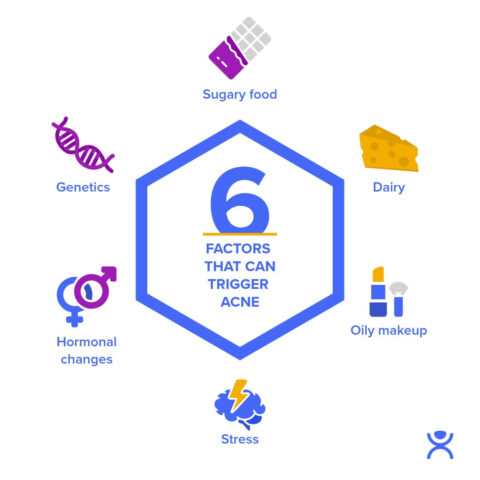
The global acne skincare market is roughly $11 billion, and we spend over a billion on it in the U.S. [1, 2]. That’s a lot of money spent fighting against pimples. Are they worth that kind of investment? Well, based on the air-brushed standards of beauty that many cultures have, it’s not surprising that everyone would be concerned. Is it really just a matter of healthier, cleaner skin though, or is acne genetic? Let’s dig a little deeper and find out.
The Problem of Acne And Genetics
Acne is typically associated with puberty and being a teenager. It happens to most, to a lesser or greater degree, and one hopes they are lucky enough to avoid it. That’s because it affects about 90% of boys and 80% of girls at some point in their teen years [3, 4]. Adults get acne too, however. Women are particularly at risk, with 15% of adult women in the US affected [5].
For most, it’s a nuisance one puts up with. For others, it’s embarrassing and difficult to deal with. For some though, it can lead to scarring that has long-term psychological effects [6]. That fear motivates people to take action against it, and often that action costs money [7, 8, 9].
Acne is also more than just oily skin. A big influencing factor when it comes to acne is your environment. This can mean anything from what you eat to how stressed you are. There are studies out there looking at non-westernized cultures, living in non-westernized environments that literally have zero incidences of acne [10]. So, we can certainly say that environment plays a major role.
Another major risk factor for acne is genetic [11]. Genes involved in acne may influence [11, 12, 13, 14]:
Different Types of Acne
Acne gets its name from the bacteria Cutibacterium acnes (C. acnes). It’s normal for C. acnes to live on your skin, mainly in and around the hair follicles. There are several sub-groups of this bacterium, some of which are associated with acne, while others are actually beneficial to skin health.
Skin treatments of the past have focused on wiping them all out, but since research has been able to isolate the specific culprits, new treatments will hopefully be able to narrow the focus and leave healthy bacteria intact [15].
Researchers aren’t sure about the exact cause of acne. It is an interplay of hormones, inflammation, excessive sebum (skin oil) and shedding of follicle cells, and the growth of C. acnes.
One possible explanation why this skin condition is more common in teens is that the body makes more sex hormones during puberty. These hormones can increase the production of sebum, a skin oil that can plug a follicle along with dead skin cells. In response, the bacteria Cutibacterium acnes (C. acnes) can begin to grow [16, 15].
Acne is easily recognized by the pimples that appear mostly on the face and back [11, 15]. While there is no specific type, it does manifest itself in a variety of ways, with increasing levels of severity. These different types of acne include the following [17]:
- Blackheads: Open bumps on the skin that fill with excess oil and dead skin. They look as if dirt has been deposited in the bump, but the dark spots are actually caused by an irregular light reflection off the clogged follicle.
- Whiteheads: Bumps that remain closed by oil and dead skin.
- Papules: Small red or pink bumps that become inflamed.
- Pustules: Pimples containing pus. They look like whiteheads surrounded by red rings. They can cause scarring if picked or scratched.
- Fungal acne (pityrosporum folliculitis): This type occurs when an excess of yeast develops in the hair follicles. They can become itchy and inflamed.
- Nodules: Solid pimples that are deep in your skin. They are large and painful.
- Cysts: Pus-filled pimples. These can cause scars.
Nobody wants these. They are often the bane of a young adult’s existence. The preferred option to managing the problem of course, is to not have the problem at all. This means understanding what can trigger acne.
What Are The Risk Factors For Acne?
Every teen hopes to prevent acne from ever happening. Many adults dread its seemingly random appearance. Given the difficult interplay of factors involved, finding a precise cause has proven elusive. There is no magic ointment to prevent acne at this point in time. So, you can raise the odds you won’t have to deal with it or at worst, make the symptoms manageable.
This can be accomplished by understanding what sets your acne off. Factors that may trigger or worsen acne include [11, 18]:
- Sugary food
- Dairy
- Oily makeup
- Stress
- Hormonal changes
- Genetics

Most over-the-counter facial cleansers target the external element of acne, like excess oil and debris on your skin’s surface. However, one factor that may play a role in your chances of experiencing acne is genetics, adding another facet to your daily skincare routine.
There are occasions too, when scientific advancement can get in the way and potentially create a hindrance instead of a benefit. Acne is a good example of this, where the typical antibiotic treatments given to millions to quell the problematic bacteria, have given rise to resistant strains that can make treating acne more difficult [19].
Is Acne Genetic?
Your DNA affects everything about you in one way or another, directly or indirectly. One factor that has a relatively high relationship with acne is genetics. In fact, 50-90% of differences in people’s chances of developing acne may be attributed to genetics. There are a number of potential genes involved in the factors that influence acne [11, 12, 13, 14].
Notice here that I said DNA and not genes. We have a wide range of examples of mutations in specific genes creating a specific problem for acne. However, while we have 20+ thousand protein-coding genes, we have 10+ thousand non-coding genes, and a vast majority of DNA involved in regulating how those thousands of genes work. Watch the informative video below to learn more:
One of acne’s primary instigators may actually be a mutation in one of these non-gene areas of DNA.
In this case, the “empty” gene area is located up the DNA strand from a gene called MYC, which is involved in the expression of sex hormones. This is the hormone involved in the formation of acne. Researchers have linked this mutation to increased expression of MYA, which means higher levels of androgens and a greater risk for acne.
A more direct gene link may be with the OVOL1 gene. One of the primary targets of facial cleansers is dead skin, which may promote acne by blocking pores. A particular variant in the OVOL1 gene is linked to acne. It may promote skin cell growth, leading to excess dead skin cells. Light therapy may help target this effect by slowing skin cell growth [16, 20, 21, 22].
Analyzing Your DNA Can Help You With Acne
Contrary to what you may think, knowing if your predispositions to acne are genetic may be an advantage when it comes to finding strategies to improve your skin health.
Knowing if a risk factor for your acne is genetic can help you target your problem genes and hopefully clear your skin. Not only are your genes involved in your risks for acne, but they also play a role in how likely strategies to improve skin health are to work for you.
Another example of how your DNA may play a role is a variant in the IL1A gene, which may promote acne by increasing inflammation. Depending on which variant you carry, anti-inflammatory agents, such as zinc and niacinamide, may help by calming skin inflammation [23, 24, 25].
The SelfDecode Acne report allows you to optimize your health by uncovering what your genes are doing behind the scenes to affect your odds of struggling with acne.
SelfDecode analyzes over 31,000 genetic variants related to acne to give you the most precise data on your personalized report.
SelfDecode uses AI and machine learning to calculate your genetic risk for acne and provides diet, supplement, and lifestyle recommendations to help you optimize your response to acne. With SelfDecode, you’ll gain access to over 35 DNA Wellness Reports covering topics such as acne, psoriasis, eczema, and much more.
Concluding Remarks About Acne And Genetics
A health issue without a specific cause is difficult to deal with. Nobody wants to be stuck having to just “manage” symptoms. There’s a reason so much money is spent on treatments for acne. It’s a managed disease that one must address through diet and skincare.
Unfortunately, we must also deal with the issues like treatments eventually creating their own problems like C. acnes becoming more resistant to antibiotics. Knowing this kind of information, however, can help you to pursue other avenues or response.
One important risk factor for acne is genetics, and it involves much more than just your skin health. Your genes may also play a role in other areas that may affect your chances of experiencing acne, like how you handle stress.
Understanding your genetic predispositions may help you make targeted changes to your lifestyle. Be proactive and start today by investigating your DNA to discover ways you can address acne issues. For a gene-based approach, you should check out SelfDecode.
Related
- Is Eczema Genetic? How Your Genes May Actually Affect Your Risks
- Is Psoriasis Genetic? What It Is, Triggers & How To Manage


